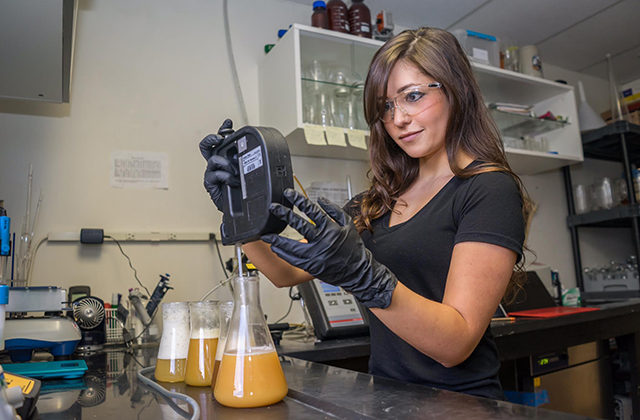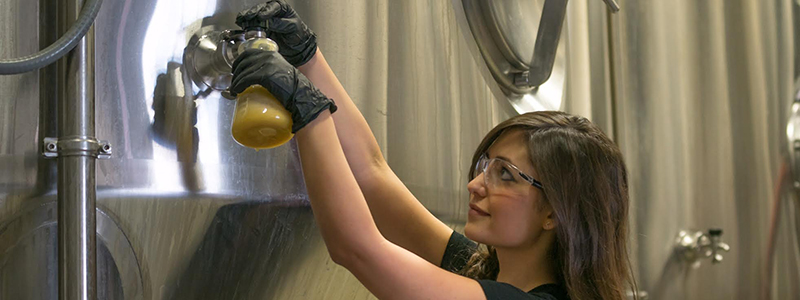
Beating the drum on quality has been a mainstay for all breweries over the last three to five years as the sheer number of facilities have increased. More and more quality jobs have been created in breweries to make sure that not only is a beer clean, but also its shelf stable and consistent from batch to batch and package to package.
As lab teams expand, so do job requirements, and many breweries are looking to the next generation of not just brewers, but lab members to take business to the next level.
The skill set for working in a brewing laboratory is multifaceted and requires a bit of flexibility between disciplines, as well as a disposition toward critical thinking, said Upslope Brewing’s Laboratory & Quality Control Manager, Mara Miller.
“For example, I have a degree in chemistry, however, I run all of the microbiological control and sensory analysis in addition to the chemical/biochemical analysis,” she said. “Often the best candidates are those who have college-level laboratory experience and technical skills. These skills create a strong foundation upon which brewery-specific tasks can develop. It is also a plus if a candidate can problem solve, work well in groups and won’t be distracted/bothered by the loud production setting.”

BridgePort Brewing has had a pretty stable team in the lab that consists of two members along with a few interns over the summer from Oregon State University, said the brewery’s Brewmaster Jeff Edgerton.
“When we hire for the lab we mostly look for someone that has a combination of brewing knowledge/experience combined with training in wet chemistry methods,” he said. “Brewing and Brewing QA are somewhat esoteric fields so you don’t always get exactly what you are looking for.”
Edgerton added that having a very specific methodology in order to generate consistent results with set out testing protocols is a key since then whomever steps in to train people can have the same solid lab technique.
For Odell Brewing, QA/QC Manager Eli Kolodny said that when the brewery made additions to its lab team — which is a part of the overall quality department — a four-year degree is a must.
“It was sought after in previous years before I was here,” said the seven-year veteran of the long-standing Colorado brewery, “but it’s a must have now.”
It doesn’t have to be a Brewing Science major he said, noting that many in the lab team have Biochem or Food Safety as their majors.
The overall quality team has focuses on not just lab work, but also in tasting panels, yeast management and micro analysis along with dedication to quality checks on raw material and packaging, all the way down to the glue for labeling.
Project management is also a vital role. Odell, which early on was deliberate in making sure its product was ready for bottling, but was draft-only for years, only recently added a canning line along with a new kegging line. Those projects were in the works for more than two years and quality assurance was on Kolodny’s mind. He said that at Odell the thought process was that at least 10 hours per week needed to be dedicated to quality on the new packaging. That meant creating a new job or spreading that work through the department. It lead to a new hire that was able to handle that position along with other projects and quality dedication.
“You have to hire people making sure they are present and focused and feel the commitment to quality,” he said. “We always have stuff to do. And I’m famous here for coming in and wrecking things and having weird thoughts and ideas to redirect energy to have things to do. We don’t want to burn people out, especially in the word of quality.”
For Kolodny, the best thing a brewery can do is dedicate time to quality.
“If you can’t devote time to think critically and having some sort of time dedicated to keeping up with what is going on in the brewing world, then you probably don’t have time to taste your beer,” he said.” And if you can’t taste your beer, you should stop making it.
Taste is king, but you need to have some analytics behind it, he said. Tasting the beer at packaging is too late.
“They should be tasting their beer at every stage — wort, krausen, to chill down, to clarified and in the package and beyond packaging for stability,” he said, adding that testing should include a battery of tests, including storing packaged beer in the worst possible conditions.
“Something that you think is it’s worst-case scenario for how it’s packaged,” he explained.
Along with time is knowledge, Edgerton said. He was asked several years ago to put together a basic guide to QC/QA for a brewery that was just getting started.
“They wanted to know what equipment was absolutely necessary in order to do a basic lab,” he said. “I spent quite a bit of time thinking about it and responded with a guide that outlined three levels of laboratory from the most basic to the most complex. The amount of equipment was surprisingly small for a basic laboratory, but the need for a knowledgeable, pragmatic person to make the best use of the equipment was absolutely essential.”
A lot of knowledge can be gleaned from the American Society of Brewing Chemists, said Kolodny. He pointed out that a lot of the information available is now more economical for smaller breweries because the stress for quality is so high now and the mass amount of breweries that need that knowledge is greater than ever before.
“I would strongly encourage anyone to reference them,” he said. “It’s a great collection of roughly what needs you should be focusing on.”
Does size matter? Do you need more equipment or more people? Not necessarily said Edgerton, who pointed out that two people in the lab can be effective if they are used properly.
“We consider our lab to be a production lab, not research, so we don’t run tests without using the data that is generated,” he said. “I believe that it’s more important that the Brewmaster supports his staff by respecting the results and recommendations that come from the laboratory.
“You can have 20 people in a laboratory that won’t be effective if they don’t have support from the management.”




Be the first to comment